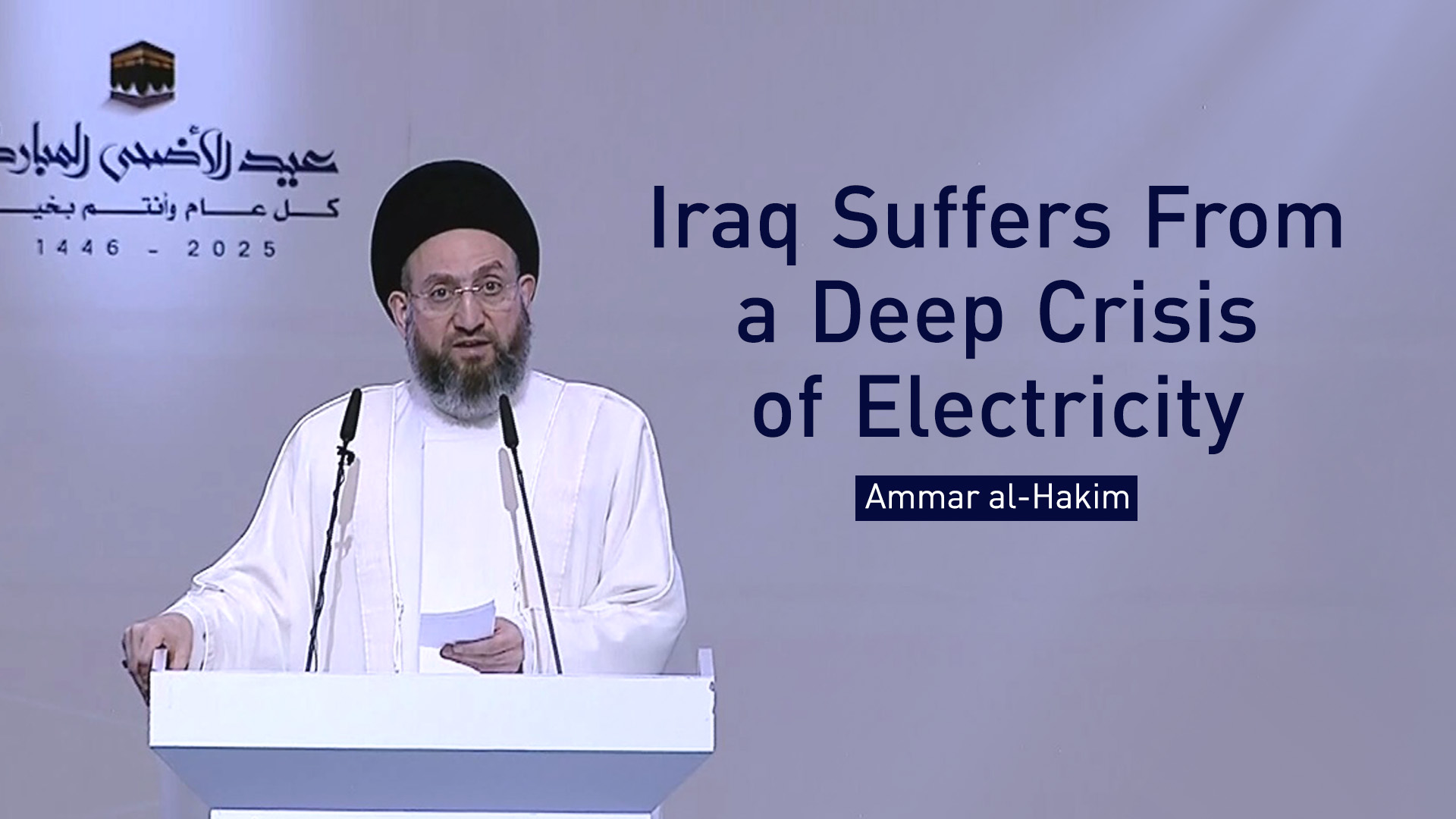'Power Cuts Reflect Collapse of Basic Services in Iraq,' Says Al-Hakim
Iraqi cleric Ammar al-Hakim used his Eid sermon to condemn the country’s chronic electricity crisis and political dysfunction, calling it a failure of governance. Amid soaring heat and worsening blackouts, he urged urgent reforms and accountability, warning public patience is wearing thin.

By Kamaran Aziz
ERBIL (Kurdistan24) – Iraq’s chronic electricity crisis once again took center stage during the Eid al-Adha sermon delivered by Ammar al-Hakim, head of the National al-Hikma (Wisdom) Movement, who described the country as gripped by a severe breakdown in democratic institutions and basic services, particularly electricity. His remarks come as record temperatures and blackouts continue to strain millions of Iraqi households and expose structural failures in Iraq’s governance and infrastructure.
Speaking in Baghdad on Saturday, June 7, 2025 – the first day of Eid al-Adha for Shiite Muslims – al-Hakim lamented that Iraq remains mired in a profound service delivery crisis. “The government must not deprive citizens of basic services,” he said. “Dodging responsibility is half of the reason for our problems. Let us not chase illusions about solutions – let us face the people with the truth and tell them who is responsible for these crises.”
Al-Hakim highlighted electricity as a central concern, emphasizing, “Despite years of promises and budget allocations, the crisis remains, and every year the people endure harsh blackouts. Our top priority must be resolving this crisis.” He warned that Iraq’s governance structures are failing to meet even the most basic public expectations. “Any future government must make electricity provision its highest priority,” he added.
This urgent call to action coincides with deepening public frustration over nationwide blackouts and water shortages, exacerbated by the predicted summer heat wave. As previously reported by Kurdistan24, Iraq has already lost over 4,100 megawatts of power due to a dramatic reduction in Iranian gas imports, which have dropped to 18 million cubic meters per day amid U.S. sanctions and unresolved debt disputes.
Ahmed Musa, spokesperson for the Iraqi Ministry of Electricity, told Kurdistan24 on May 29, 2025, that although Iraq’s technical capacity could theoretically reach 26,000 megawatts, the country actually requires over 50,000 megawatts to meet its full domestic demand. “The electricity issue isn’t solely about gas imports,” he said. “The real challenge is broader: infrastructure, diversification, and mismanagement.”
Since 2003, Iraq has spent over $60 billion on its power sector. Yet, as Kurdistan24 has previously reported, backouts persist due to widespread corruption, mismanagement, and continued reliance on imported energy – primarily from Iran, which supplies approximately a third of Iraq’s electricity.
Frequent disruptions, often due to financial or political tensions, leave Iraqi cities in darkness at the height of summer.
Iraq has begun exploring alternative suppliers such as Qatar and Oman, particularly after the U.S. revoked a waiver allowing Baghdad to purchase Iranian gas despite sanctions. Türkiye has also stepped in, agreeing to double electricity exports to Iraq to 600 megawatts and exploring new gas agreements to help stabilize power delivery across Iraq and the Kurdistan Region.
In the Kurdistan Region, the KRG’s Runaki project – Spearheaded by KRG Prime Minister Masrour Barzani – continues to expand, aiming to provide 24-hour electricity through modernized infrastructure. The project has already reached thousands of residents in Erbil, Sulaimani, and Duhok and is scheduled to cover the entire Region by 2026.
Amid these developments, al-Hakim’s speech also addressed political dysfunction, criticizing a “market for buying citizens’ votes” and urging reforms to Iraq’s democratic process. “Government formation in Iraq must be rooted in ballot boxes and people’s vote,” he said. “If governments are not formed through elections, then legitimacy is absent.”
He reiterated the need to end vote-buying, calling it a betrayal of public trust: “It is shameful that today we have a market for buying and selling political positions and citizens’ votes.”
The sermon also warned against attempts to fragment Iraq. “There are those who seek to sow discord among us,” al-Hakim said, stressing that national unity must be protected.
While these political themes were significant, al-Hakim’s strongest and most urgent appeal remained focused on resolving Iraq’s electricity crisis, which he described as a symbol of the country’s deeper governance failure. “Let us tell the people the truth,” he said. “Let us identify who is responsible.”
As Iraq heads into another scorching summer with no long-term solution to its electricity crisis in sight, the public’s patience appears to be running thin, and the pressure on Baghdad to act decisively has never been greater.
